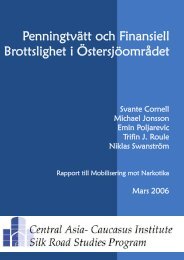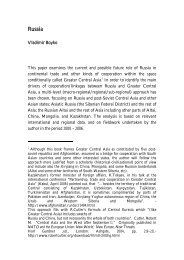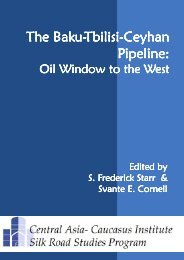Eurasianism and the Concept of Central Caucaso-Asia
Eurasianism and the Concept of Central Caucaso-Asia
Eurasianism and the Concept of Central Caucaso-Asia
Create successful ePaper yourself
Turn your PDF publications into a flip-book with our unique Google optimized e-Paper software.
Rethinking <strong>Central</strong> Eurasia 47<br />
territory – Abkhazia, Nagorno-Karabakh, <strong>and</strong> South Ossetia – which<br />
undermine <strong>the</strong> political <strong>and</strong> economic stability <strong>of</strong> <strong>the</strong> entire <strong>Central</strong><br />
Caucasus. The situation worsened after Russia invaded Georgia in August<br />
2008 <strong>and</strong> recognized <strong>the</strong> independence <strong>of</strong> Abkhazia <strong>and</strong> South Ossetia. The<br />
problem <strong>of</strong> instability in <strong>the</strong> <strong>Central</strong> Caucasus is also compounded by <strong>the</strong><br />
fact that <strong>the</strong> conflict territories <strong>the</strong>mselves are becoming a bastion <strong>of</strong><br />
terrorism <strong>and</strong> refuge for criminals engaged in drug trafficking <strong>and</strong> <strong>the</strong> drug<br />
trade, as well as zones for money laundering, kidnapping, <strong>and</strong> human<br />
trafficking. 145 Thus, <strong>the</strong> idea <strong>of</strong> achieving unity in <strong>the</strong> <strong>Central</strong> Caucasus (<strong>and</strong><br />
in <strong>the</strong> Caucasus as a whole) can be considered an ideal <strong>the</strong> residents <strong>of</strong> this<br />
region should really be striving for. 146<br />
The international relations <strong>of</strong> <strong>the</strong> <strong>Central</strong> Caucasian countries are largely<br />
determined by historical roots. These roots influence significantly <strong>the</strong><br />
International Affairs, 2001); Svante E. Cornell, Small Nations <strong>and</strong> Great Powers. A Study<br />
<strong>of</strong> Ethnopolitical Conflict in <strong>the</strong> Caucasus (Surrey: Curzon Press, 2001); Svante E. Cornell,<br />
“Autonomy as a Source <strong>of</strong> Conflict: Caucasian Conflicts in Theoretical Perspective,”<br />
World Politics, Vol. 54, No. 2 (2002), pp. 245-276; Tamara Dragadze, “Ethnic Conflict as<br />
Political Smokescreen: The Caucasus Region,” in Håkan Wiberg <strong>and</strong> Christian P.<br />
Scherrer, Ethnicity <strong>and</strong> Intra-State Conflict (Aldershot: Ashgate, 1999), pp. 262-279;<br />
Shireen Hunter, The Transcaucasus in Transition: Nation-Building <strong>and</strong> Conflict<br />
(Washington, D.C.: CSIS, 1994); Ivlian Khaindrava, “Karabakh <strong>and</strong> Abkhazia: The<br />
Dynamics <strong>of</strong> Non-Settlement,” <strong>Central</strong> <strong>Asia</strong> <strong>and</strong> <strong>the</strong> Caucasus, No. 1 (13) (2002), pp. 80-<br />
91; Charles King, “The Benefits <strong>of</strong> Ethnic War: Underst<strong>and</strong>ing Eurasia’s Unrecognized<br />
States,” World Politics, Vol. 53, No. 4 (2001), pp. 524-552; Dov Lynch, Engaging Eurasia’s<br />
Separatist States. Unresolved Conflicts <strong>and</strong> De Facto States (Washington, D.C.: United<br />
States Institute <strong>of</strong> Peace Press, 2004); Edgar O’Ballance, Wars in <strong>the</strong> Caucasus, 1990-1995<br />
(New York: New York University Press, 1997); Christopher Panico <strong>and</strong> Jemera Rone,<br />
Azerbaijan: Seven Years <strong>of</strong> Conflict in Nagorno-Karabakh (New York: Human Rights<br />
Watch, 1994); Vladimir Socor, “Frozen Conflicts: A Challenge to Euro-Atlantic<br />
Interests,” in Ronald D. Asmus, Konstantin Dimitrov <strong>and</strong> Joerg Forbrig, eds., A New<br />
Euro-Atlantic Strategy for <strong>the</strong> Black Sea Region (Washington, D.C.: The German<br />
Marshall Fund <strong>of</strong> <strong>the</strong> United States, 2004), pp. 127-137; Thomas de Waal, Black Garden.<br />
Armenia <strong>and</strong> Azerbaijan Through Peace <strong>and</strong> War (New York: New York University<br />
Press, 2003); Alexei Zverev, “Ethnic Conflicts in <strong>the</strong> Caucasus 1988-1994,” in Bruno<br />
Coppieters, ed., Contested Borders in <strong>the</strong> Caucasus (Brussels: VUB University Press,<br />
1996), pp. 13-71.<br />
145 Alla Yaz’kova, “Iuzhniy Kavkaz: uravnenie so mnogimi neizvestnymi” [Sou<strong>the</strong>rn<br />
Caucasus: <strong>the</strong> Equation With Many an Unknown], Vestnik analitiki [Analytical<br />
Herald], No. 2 (20) (2005), pp. 57-58.<br />
146 Gajiev, Geopolitika Kavkaza, p. 92.






